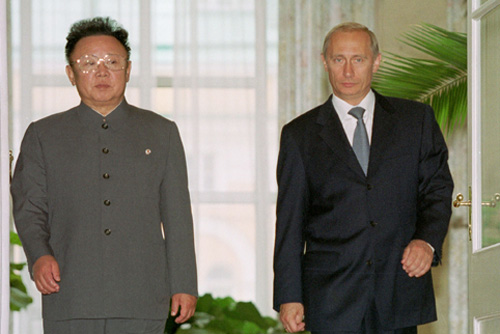A ‘diplomatic solution’ – giving North Korea incentives, first of all security guarantees to make it abandon nuclear weaponisation – should be sought. Under no circumstances should military action or attempts to change the regime be permissible. Sanctions do not help either. Only a compromise can lead to a breakthrough. Under that logic, maintaining amicable relations between Moscow and Pyongyang is imperative both for Russia’s ability to prevent dangerous developments and to influence Pyongyang to be more receptive to compromise.
Such an approach suits well the core Russian strategy based on its national interests and is in tune with the policies of its ‘strategic partner’ China. It is also useful to contain potentially hostile Western ambitions in a vital area where Russian positions have never been strong enough. This accounts for Russia’s seeming ‘passivity’. Deep in the heart of many Russian policy makers is the belief that a nuclear North Korea is less appalling than that of a destroyed North Korea.
The status quo, which is actually not deleterious to Russia’s overall regional position, and can only be considered an indirect challenge to its global priorities, in my opinion, suits Russian interests.
What is the actual threat from DPRK’s limited nuclear potential for Russia? In my opinion the actual use of a DPRK nuclear weapon is highly improbable. An accident or turmoil in North Korea, resulting in loss of control over nuclear materials or a technical accident, are possible dangers. But these amount to reasons for Russia to prevent both kinds of developments and to prioritise them over denuclearisation. Denuclearisation of North Korea without a solid system of collective security in the region, could increase military risks.
What exactly denuclearisation means is yet to be determined. Even if actual weapons and production facilities are disposed of, human and scientific capital and expertise in things nuclear in North Korea would not disappear overnight. Furthermore, verification that the country has really ‘denuclearised’ cannot be reached under the current political regime.
If denuclearisation under the current rules of the game seems unattainable, why should Russia put it ahead of other goals, namely, the goal of stability in Korea? A collapse of the North Korean state, involving de facto occupation by South Korea, is not how Russia would like to see the future. Another possibility is ‘soft’ regime change with Chinese involvement [. Such a scenario would also mean an increase in regional tensions and a possible arms race, which would certainly follow from what would be perceived in Asia as a new Beijing hegemonism. Under any of these scenarios Russia will lose. It would probably also be totally devoid of leverage and ability to influence the development of the situation or the post-change leadership.
For Russia the more viable option is trying to rein in the DPRK nuclear potential – to ‘manage the risks’, silently agreeing to the temporary preservation of the current, limited potential. The condition is responsible DPRK behaviour: no new tests, or international proliferation, no new development of nuclear or missile technology. This is feasible and can be achieved through the diplomatic process.
This would only occur in a distant future, when a new generation leadership has emerged and relations between the DPRK and the world have improved based on the country’s own transformation. Then, the need for a ‘nuclear deterrent’ for Pyongyang would probably disappear.
In the meantime, the only existing partner in maintaining the status quo is the current North Korean elite. They need guarantees And there is no alternative to communication with them. Pyongyang’s aims are to remove military-political threats to the regime, achieve security arrangements, prevent foreign interference, and obtain economic assistance. The mechanism to discuss these concerns exists. It is again the Six-Party Talks. Denuclearisation is only one track of these talks, and is actually even a secondary one.
As the member of the talks with the least ‘egoistic’ interests and responsibility to manage the issues of the mechanism of peace and security in North East Asia, Russia should put forward such an agenda. Any attempts to ignore Russian interests and role in the multiparty diplomatic process would be unacceptable.
Georgy Toloraya is Director of Korean Programs, Institute of Economy, Russian Academy of Science, Moscow.
A version of this article was first published here [https://www.japanfocus.org/site/view/103] at The Asia-Pacific Journal: Japan Focus.

